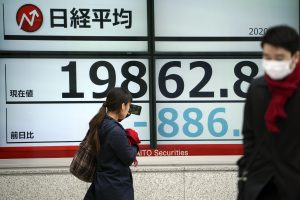Japan’s economy contracted at a dismal 7.1 percent annual rate during the October-December period, worse than the initial estimate, raising fears the world’s third largest economy could be headed to a recession.
The contraction was the first for Japan in more than a year and followed an October 1 increase in the sales tax, which hit retail spending. The Cabinet Office data, released Monday, were a revision from last month’s estimate of a 6.3 percent decline.
The data do not reflect the steep downturn in tourism and other business activity related to the virus outbreak that has spread from China to much of the world. Most economists are forecasting another contraction in the current quarter, and possibly for the year, for the world’s third largest economy.
An “Economy Watchers” survey also released by the Cabinet Office on Monday showed a sharp decline in all kinds of business activity to levels last seen nine years ago just after the devastating March 11, 2011 earthquake, tsunami, and nuclear plant meltdowns in northeastern Japan.
Preliminary data from the Finance Minister also showed imports falling nearly 17 percent in the first 20 days of February from a year earlier.
Economist Harumi Taguchi of IHS Markit forecasts that the economy may contract by an annual rate of 0.3 percent in 2020, recovering to 0.9 percent growth in 2021.
Consumers did boost spending on some items as they stockpiled toilet paper, surgical masks, and other supplies out of concern over the virus outbreak. But such spending won’t fully offset the impact of absent tourists and empty stadiums, amusement parks, and other venues as Japanese heed calls to avoid big gatherings to help prevent the spread of the virus, she said.
On a quarterly basis, the economy shrank 1.8 percent in October-December from the previous quarter. The earlier estimate was of a 1.6 percent contraction.
Domestic demand, including investments and consumption fell 2.4 percent. Government spending was flat. A technical recession is defined as two consecutive quarters of contraction.
Yoshimasa Maruyama, analyst with SMBC Nikko Securities, called the situation “serious.”
“The recession could be more than just technical and the economy could really decline,” he said.
Japan’s benchmark Nikkei 225 has dropped over the news of the virus outbreak, which began in central China late last year and has now spread to about 100 nations, sickening people from Italy to Washington state in the U.S. The Nikkei plunged again in Monday trading, losing 5.1 percent to 19,698.76, its lowest level since late 2018.
Japan has been trying to wrest itself out of the economic doldrums by encouraging lending and public works projects. The government has announced various stimulus measures to counter the slowdown.
The central bank has promised to do whatever needed to support financial markets and businesses, but having kept the main interest rate at minus 0.1 percent for several years, it has limited room to maneuver, analysts say.
Yuri Kageyama for The Associated Press.

































